Language study trip to Colombia
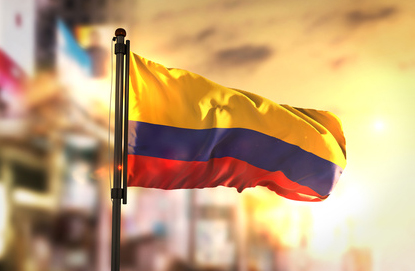
Colombia, which takes its name from the famous explorer Columbus without ever having hosted him, is affectionately called Locombia - the crazy country - by the locals.
For decades, Colombia was a red rag for travelers; guerrilla warfare and drug mafias turned this beautiful country into a war zone. But that is now over: After a long period of unrest, peace and security have finally returned. However, the country is (still) considered an absolute insider tip among travelers and therefore has numerous beautiful, untouched spots waiting to be discovered. So now is the right time for a language study trip to Colombia. Various language schools offer exciting language courses here. Combine learning Spanish with discovering a wonderful country and a hospitable culture!
Country, regions and cities
White dream beaches on the Caribbean Sea, lush stretches of land in the Amazon with dense rainforest, the majestic volcanoes and mountainous landscapes of the Andes, picturesque villages with colonial-style buildings, dynamic cities with great expectations for the future and much more take visitors to Colombia's breath away.
No matter where your language study trip to Colombia is planned, there are some highlights of the country that you should definitely not miss on a language study trip to Colombia. One of the country's true treasures is the so-called "lost city" of Ciudad Perdida. During the country's long period of unrest, it was considered too dangerous to visit this important cultural site. Now that the fighting between guerrillas and drug gangs has ended, this truly impressive cultural heritage site can be visited without hesitation. The vibrant seat of government, Bogotà, at an altitude of over 2600 meters in the Andes, also delights visitors with its impressive architecture and sights.
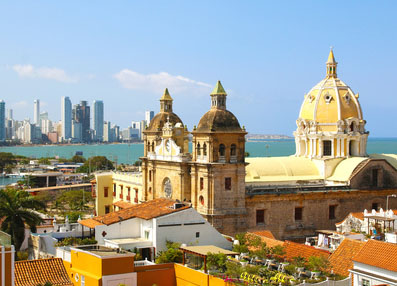
The town of Leticia, close to the border triangle with Peru and Brazil, is also an ideal place to stay and an ideal starting point for impressive excursions into the Amazon, where rare plants and animal species can be admired. A true paradise for the adventurous on a language trip.
Medellìn is considered the center of music and is known for its vibrant nightlife. The city is therefore very popular with young people for language study trips. The city is known for its flower festival, Feria de las Flores, and its large, flower-filled green spaces. There is also the black monolith La Piedra del Penol, which is around 220 meters high. It is located near the city of Medellìn and is definitely worth a visit. A climb up the monolith is well worth it, because after climbing the 659 steps you can see vast green fields and reservoirs as far as the eye can see. The picturesque village of Guatape with its bright and colorful facades is a feast for the eyes.
Villa de Leyva, voted the most beautiful town in Colombia by Lonely Planet, lies in the Andes at 2140 meters above sea level in a landscape reminiscent of the mountainous landscape of Graubünden. Romantic cobblestone streets lined with magnificent buildings lead to the largest village square in the whole of South America.
From the coastal city of Cartagena, it is worth making a detour to Isla Mucura - an island that makes the wildest dreams of pristine Caribbean beaches come true. The Tatacoa Desert with its Wild West charm, the mysterious rock sculptures in San Augustìn or the fascinating coffee plantations also attract visitors to the country.
A language study trip to Colombia should therefore definitely be combined with a tour of this wonderful and diverse country. By discovering Colombia's cultural pre-colonial roots, you can deepen and expand your Spanish skills in contact with the extremely hospitable and cheerful Colombians.
Itinerary
Various airlines offer flights from Switzerland to Colombia's capital Bogotà. Most bookings include a transit or stopover within Europe. Domestic flights are also the most convenient way to reach the various destinations in the interior of the country. The flight network in Colombia itself is very dense.
Climate and weather in Colombia
Colombia is close to the equator, so temperatures in the various climate zones are fairly constant throughout the year. A language study trip can therefore be planned at any time of year. The temperature differences are very large due to the different climatic regions and altitudes of the country. Different climate zones can be crossed within a few hours of traveling in Colombia. This is why it is particularly important to pack enough clothes of varying warmth for a planned round trip. It is much cooler in the Andes than in the lower-lying subtropical and tropical areas and on the coast.

Language schools in Colombia
The language travel providers in Colombia are located in the following three cities:
- Bogotà in the Andes with 7.8 million inhabitants in a humid, tropical mountain climate.
- Cartagena on the Caribbean coast with just under 1 million inhabitants.
- Medellìn in the tropical Aburra Valley with almost 2.5 million inhabitants.
The language schools in these cities in Colombia offer a wide range of language courses. Depending on the desired intensity, between 17 and 30 weekly lessons can be booked, some of which can be supplemented with private lessons or organized leisure activities at an additional cost. Class sizes vary between five and eight students, so rapid learning success is guaranteed. Private courses can of course also be booked. Group courses are highly recommended because they allow you to make social contacts. People are often braver together and prefer to mingle with other people. Joint activities and excursions are fun and learning Spanish during a language course in Colombia is simply a side effect.
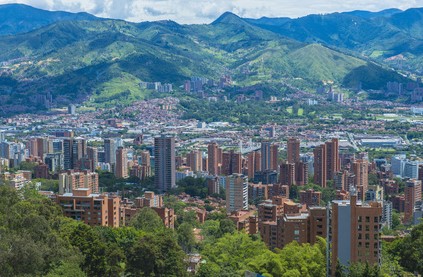
Some language schools in Colombia also offer arrangements for Work & Study, where in addition to the 20 Spanish lessons a week, students do an afternoon of voluntary work. In addition, various courses (e.g. cooking, percussion and dancing) are included in the all-inclusive course price. Such offers usually require a minimum booking of four weeks and cost around 25% less than a standard language course.
Accommodation during the language study trip in Colombia can be booked either with a host family or, in the case of some schools, in student residences. Experience has shown that living with a local family is almost a guarantee for learning Spanish quickly. Sharing everyday life with a Colombian family provides insights into the culture that would otherwise be denied. A language study stay with a family in Colombia is therefore certainly the best choice for rapid progress in Spanish.
Entry requirements
Swiss nationals do not require a visa to enter Colombia if their stay is for tourism purposes only. However, as soon as a language study trip is planned, a student visa may need to be applied for. This should be done in advance at the Colombian embassy in Bern (http://www.botschaft-bern.com/kolumbianische.html) should be clarified.
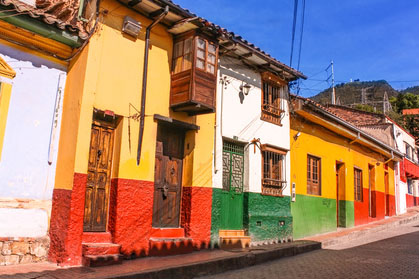
Security
Although the country is generally considered very safe for travelers since the peace agreement in 2016, the crime rate in Colombia is still relatively high. Organized crime is also still present.
It is extremely important that you do not mix with unruly crowds. Public demonstrations, road blockades or strikes, which mainly occur in Bogotà, should also be avoided at all costs. Such unrest can paralyze the public transport network and block transport routes. In such cases, it is essential to look for alternative travel routes. The local authorities make every effort to protect travelers and provide timely information and advice. It is important to follow the instructions of the local authorities exactly.
The unrest and danger zones for organized crime are in many cases concentrated in the border areas with Venezuela and Ecuador, the department of Cauca and Isla Gorgona. In rural areas, solitary walks and night-time cross-country journeys should be avoided.
If you want to travel safely in Colombia, you should preferably stay in larger cities and towns with tourist infrastructure and in public buildings.
Anyone planning to visit the Amazon should make sure they have the necessary and recommended vaccinations before their trip.
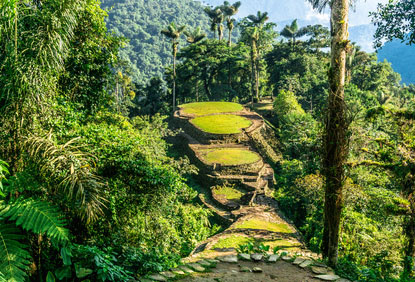
Costs
A standard course with 20 lessons per week costs between 190 and 220 francs per week. The price varies depending on the number of lessons per week. Private lessons are offered at all schools and cost around double or triple the standard course price.
Accommodation with a host family with breakfast costs an additional CHF 200 to 230 per week, and half board costs an additional CHF 30 to 60 per week. Accommodation without meals can sometimes also be booked in student residences. A single room costs around 200 francs per week, a bed in a four-bed room around 150 francs. If you are planning a longer stay, you can also find independent student residences or shared student flats with significantly lower monthly rents online or locally. When comparing the various offers, always pay attention to the currency quoted to avoid any misunderstandings.
During a language study trip to Colombia, you will quickly realize that the cost of living in this country is very low. A dinner in a restaurant costs between 5 and 12 francs including drinks and soup. A haircut at the hairdresser costs around 4 francs. A washing machine can be rented for 2 hours by phone, and the service costs around 2 francs including delivery and collection of the machine. A cab ride costs at least 1 franc, within the city - depending on the distance - usually between 3 and 5 francs. A metro or bus ride across the city costs around 70 centimes and multi-ride tickets are even cheaper.
Anyone who goes on a language study trip to Colombia is bound to wonder about the cost of nightlife. If you miss out on dancing and music, you would be missing out on an important part of Colombian culture. Most clubs charge no entrance fee or a very reasonable one of just a few francs. A good Colombian beer costs between 50 centimes and 3 francs when you go out. Cheers!
